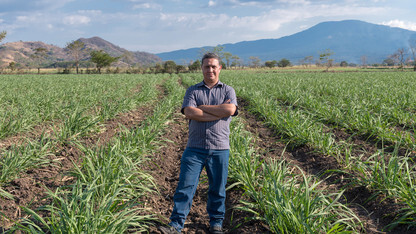
Lincoln, Neb. —Carlos Martinez has spent most of his life involved with agriculture. He grew up on his family’s sugarcane farm in El Salvador and now manages it.
His initial education, however, was not in agriculture. He received a bachelor’s degree in computer systems engineering from the University of El Salvador in San Salvador.
After he became manager of his family farm, he wanted to learn more about agronomy, so he researched online for educational opportunities and classes. He found the University of Nebraska–Lincoln Agronomy and Horticulture Online and Distance Education program and decided to start with a noncredit course in plant science taught by Don Lee, professor of agronomy and horticulture.
During that course Martinez said he discovered so many small details that in the end became so important.
“Don was a great teacher,” Martinez said. “Plant science knowledge really helped me make a difference in how I was managing my farm. This is how I became comfortable with online courses and admired the University of Nebraska.”
A couple of years later, he started working part-time for the Catholic University of El Salvador, teaching classes in irrigation systems and farm machinery and production.
At that time, the United States Agency for International Development created its Higher Education for Economic Growth program to build partnerships between industry sectors and higher education institutions in El Salvador.
Agro-industry and food processing was one of the project areas. By sharing information with and educating teachers in several universities, the United States Agency for International Development hoped to increase agriculture knowledge of students.
The Catholic University of El Salvador selected several teachers to participate in the project and Martinez was chosen. The program had two stipulations — the study program selected would be in English and in agronomy. Martinez said he didn’t hesitate even a moment to accept.
He had already learned to speak English in a short amount of time, and he wanted to start his online master’s classes in agronomy with Nebraska because he had that connection.
Charles Francis, professor of agronomy and horticulture, was assigned as his adviser. Martinez began his master’s study online with a course about land use in the developing world. He completed all his courses by distance and finished a valuable thesis on how to use biological controls for specific pest problems in vegetable crops.
“Professor Francis was so encouraging and really challenged me to give it my all and work hard to accomplish my goals,” he said.
Martinez, who earned a Master of Science in agronomy, specializing in crop physiology and production, came to the United States for the first time in May to participate in the graduate commencement and receive his degree at Pinnacle Bank Arena.
“It was so amazing and impressive,” Martinez said. “I really took the chancellor’s words, ‘Now you are a part of the University of Nebraska,’ to heart. It was very motivating.”
He said he also enjoyed the Department of Agronomy and Horticulture graduation reception, which gave him the opportunity to meet everyone in person and take some field trips to the university facilities and labs.
“Even more important to me than graduation was the opportunity to say thank you to everyone,” Martinez said. “The Agronomy and Horticulture Online program helped me so much.”
He said the faculty and staff really went the extra mile for him. “Not only did they share their knowledge and educate, but they became like family,” Martinez said. “There’s so much more to education than just transmitting information. The University of Nebraska–Lincoln was friendly, respectful and open. And this gave me confidence.”
“Carlos fully enjoyed his courses, and especially the graduation ceremony and opportunity to experience the Big Red environment firsthand,” Francis said. “It was special to see a photo of his 3-year-old son all decked out in Husker clothes when he was back in El Salvador!”
Martinez currently manages his family farm, which consists of 30 hectares (a little over 74 acres) and produces sugarcane, red beans and corn. He is also a full-time professor at the Catholic University of El Salvador, where he teaches about 40 students.
After accomplishing so much and sharing what he’s learned, he said he’s still excited about new opportunities. He’s currently working to meld his background in computer systems engineering with his agronomy knowledge to produce agriculture-based applications.







